
Some of you may have read another column that I wrote (long-term review of my GLC43 in Australia). This time, I’ll be writing on a car that couldn’t be more different.
Not too long ago, my visa status changed, and I was given 6 months to convert my Malaysian driving license to a Victorian one. In Victoria, you have to bring your own car to the driving exam, and it had to meet certain requirements. One very annoying requirement was that vehicles needed to have a physical handbrake accessible by the examiner from the passenger seat. Since none of my cars had one, I was suddenly in the market for a car that was equipped with one.
Some people said I could save a lot by just renting a driving school’s car for a few hours, but considering that I wasn’t confident in jumping straight into an unfamiliar car and parking flawlessly in one shot, I decided that I’d be much better off buying another car so that I could practice for quite a while before getting tested.
This also gave me the perfect excuse to pick up an old Mercedes from the over-engineered era. I was already casually browsing around listing website for classic Mercedeses such as the W140 S-class, W124 E-class and W201 190E for nearly a year already, so I renewed my search with even more gusto. Since the 190E was the only one out of that bunch that had a handbrake, I narrowed down my search to just that. After finding a good example with around 150k kilometres on the odometer for $5k (including roadworthy but without registration), I called the seller only to find that he sold it a day ago.
The buying process and title transfer
Because I was desperate (this was during the time when coronavirus restrictions were more relaxed, prior to a full lockdown being re-instated), I resorted to searching on Facebook Marketplace instead, and very quickly found a slightly higher mileage example (162k kilometres) for $3500, but was very immaculately maintained, with a full service history exclusively from authorized Mercedes-Benz dealerships and nearly a year’s worth of registration remaining (which is worth $810). I immediately rang the seller and discovered that she was also a paying club member of the Mercedes-Benz Club of Victoria (Incorporated) and paid for it, sight unseen. Although the photos sent by the seller showed that it had a small dent in the metal trim pieces on the grille, it was not a major issue and I could easily get a new grille for around $200 or so. I also knew that for the car to qualify for membership in the club, it had to be in a condition that was decent enough to pass the club’s standards.
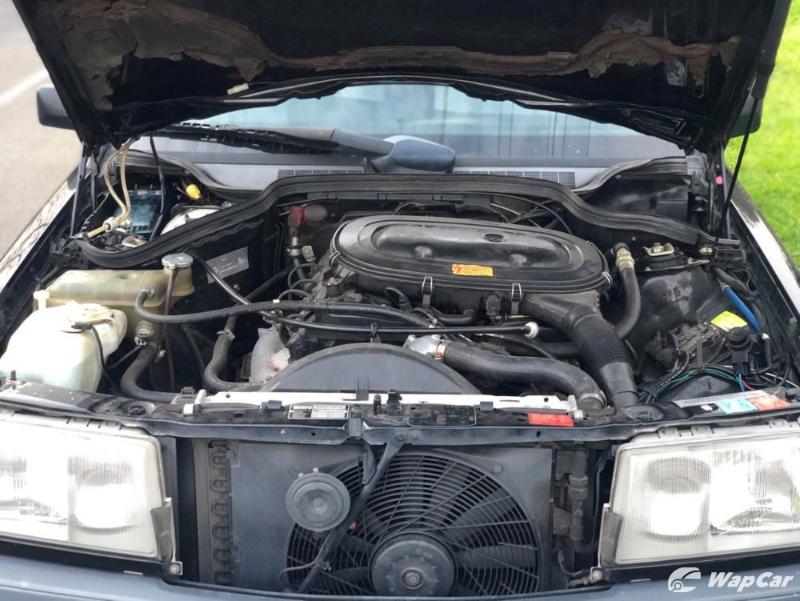
All that was left was getting 4 new tyres and brake pads ($700 in total), I sent the car for a roadworthy inspection ($150), which was compulsory before a car’s title could be transferred. After that, I went off to the nearest VicRoads office and transferring the title (which also involved paying a transfer fee of $41 and paying a motor vehicle duty of $8.40 per $200 of value – the duty ended up being $147). All in all, I spent an extra $1038 to get it completely in my ownership – bringing the total cost to $4538. Third-party insurance set me back another $470 a year (also from the same provider that insured all my other cars). I didn’t see the point in going for comprehensive because the annual premiums would cost half the value of the car itself already, and if the car was somehow totalled, so be it.
Not just any 190E – it’s special (but not necessarily in a good way)

This Mercedes-Benz 190E is actually an Australian market special, badged as a 180E. It is essentially a 190E with an M102 1.8 4-cylinder engine, producing 109hp and 150Nm. However, what made it different from other 190Es sold there at that time was that it incorporated several Australian-manufactured components to dodge now-defunct import taxes of that era. It also stripped out a lot of kit in the process to bring down the price.
How barebones was it? One word – very. The equipment listed below was standard in other 190Es sold here, but stripped from the 180E:
- Headrests for rear-seat passengers
- Tachometer
- Electric windows (mine was equipped with this option though)
- Electric seats
- Heated wing mirrors
- Cruise control
- Climate control (it only had manual air-conditioning)
- Surround sound system (it only had a basic 4-speaker setup with a fader)
- ABS brakes
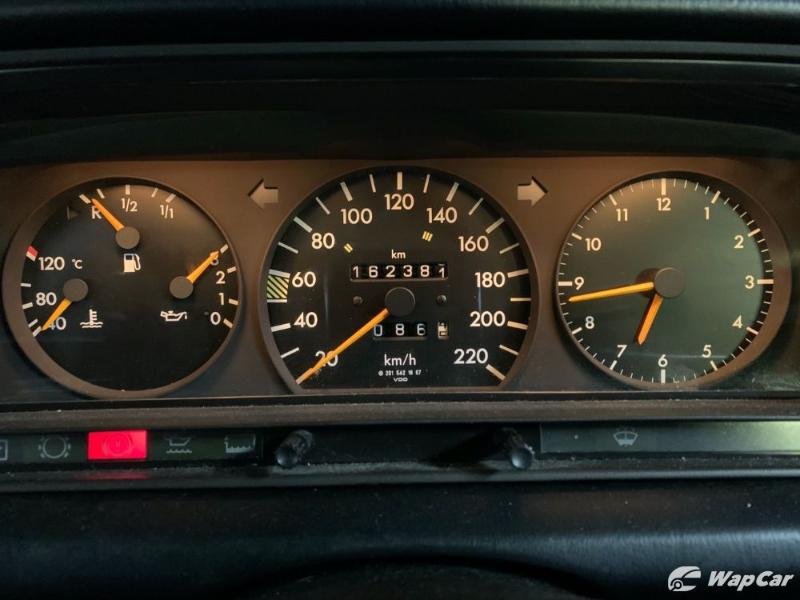
The biggest bummer was the loss of ABS brakes. As a result, I don’t take this car out in wet weather. The plus side from having pretty much nothing? It was very reliable – many of the things that the 180E didn’t have were sources of problems for higher-specced 190Es.
The 180E also came at a time after Mercedes-Benz started building M102 engines with a double-row timing chain. Earlier examples utilized a less reliable single-row version, which required replacing the timing chain every 100-120k kilometers or so. On the other hand, the double-row version pretty much didn’t need replacing (assuming if the engine is maintained well).
How much cheaper was it in 1992 Australian dollars? The poverty-spec 180E cost only $45,450 compared to the 190E 2.0 at $63,200. At that time, it was very competitively priced against the Toyota Cressida and Mazda 929 which also cost around $45,000.
Australian-market W201s also did not come with airbags. Worldwide, the W201 also did not have traction control.
Key impressions – driving dynamics and build quality
When I first drove this car home from the roadworthy testing center, it was pitch black at night and raining. I was quite unaccustomed to driving it – having been used to matrix LED headlights in my other cars, driving with halogen headlights was like driving as if the headlights didn’t exist. Worse still, the passenger wing mirror was smaller than the driver’s wing mirror, which made it difficult to see blind spots until I adjusted the rear-view mirror to reflect the passenger rear quarter of the vehicle. Even then, the mirror was not of the automatically dimming sort, which made me easily blinded by headlights from vehicles behind while looking into the mirror to change lanes.
During the drive home, I was quite surprised at how well the car handled. It was the first Mercedes to introduce a 5-link rear suspension (which was subsequently used in the W124 E-class and W202 C-class) and as a result, it felt very composed on the roads. The engine was also very smooth despite being a 4-cylinder and I can say that it definitely feels smoother than the engine in my W205 C300 or S213 E220d All-Terrain. Despite its smoothness though, it definitely felt very underpowered. However, the lack of power also made for a very smooth and relaxed drive.
Speaking of the lack of power – overtaking in this car on B-roads is impossible. Kicking down the throttle only results in the transmission downshifting to a lower gear, but without making any change in the acceleration. Regardless of whether you kicked down, or gently pressed on the accelerator, the car would only slowly increase its speed at a glacial pace.

Once I got back to my suburb, I was finally able to enjoy the car and drive it in a far more relaxed manner without having to worry about holding up other cars on the road. This was when I started to explore the car’s behaviour in detail. For starters, I noticed that the 180E always started off in second gear, unless the ‘2’ position was selected. This made for a smooth but slow start from traffic lights. However, when starting off the first gear, the car had a tendency to shift roughly into 2. I did some reading to find out why and it was because the automatic transmission was of the vacuum-controlled sort (not computer-controlled). This meant that if I let off the power too quickly at higher RPMs prior to shifting, the transmission would shift roughly into the next gear. After some practice runs, I was finally able to get the transmission to shift smoothly when starting from first gear.

When going over speed bumps, the 180E floats over them as if it was on air springs (even though it wasn’t). It didn’t feel unsettled after clearing the speed bump and felt composed. Taking corners at moderate speed also did not exhibit significant body roll. Braking performance was also quite good – the braking power was applied linearly in proportion with pedal travel. That being said, I have yet to slam down on the brakes hard yet, and probably would not want to find out given the lack of ABS.
Mercedeses from that era were famous for being over-engineered, and this baby Benz was no different. The interior felt indestructible – the dashboard material felt as though it was made of granite and the switchgear felt like a Nokia 3310. Punching the dashboard would probably only break my own fingers. Even the doors closed with a solid thunk. The only part that felt flimsy was the indicator stalk.
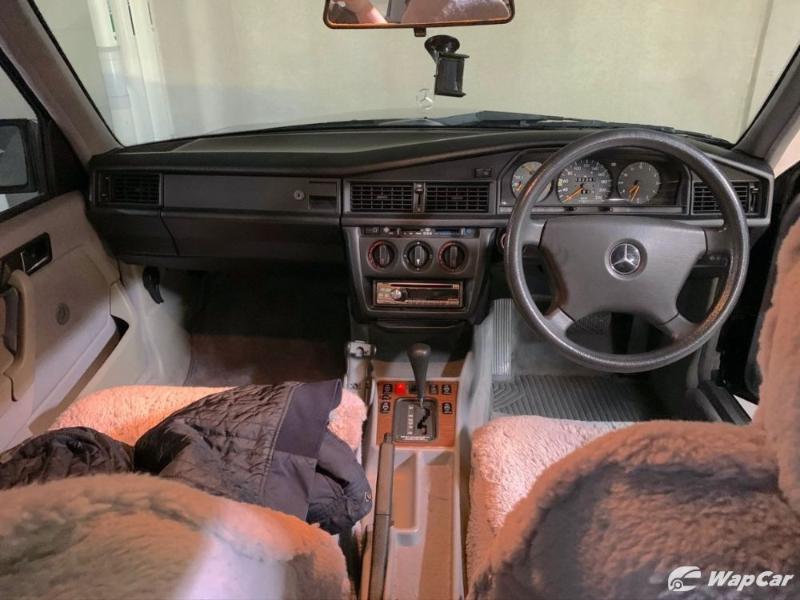
And speaking of that indicator stalk – it took some time getting used to as well because unlike other European cars, the location of the stalk was on the right side – like Japanese makes. This took a while getting used to because I’m accustomed to using my left hand to indicate. Fortunately, the left side of the steering column had nothing but empty air.
Likes and dislikes about the car
Pro #1 – simple operation of climate controls and instantaneous air-conditioning
In all my other Mercedeses, upon starting the engine, the air-conditioning system would take its own sweet time to spin up, with the fan running at a very low speed, before spooling up to the defined fan speed in the climate control settings. However, in this 180E, all I needed to do was just slide the fan’s slider to the desired position and it would blow at that speed immediately.
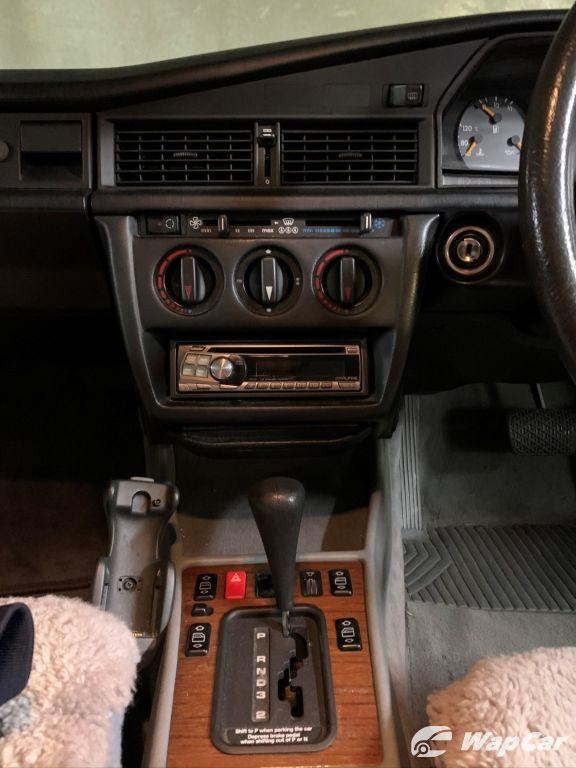
Setting the temperature was also easy – by sliding the coldness slider or twisting the heater knob. This enabled me to change the temperature on the fly while driving without having to take my eyes off the road. In my other Mercedeses, the way to change the temperature was to click a button up or down and look at the display to see what the set temperature was – taking my eyes off the road for a second or two (enough to be distracted).
Pro #2 – Reliability
Mercedeses from this era were famous for being over-engineered. Many of them are still seen in North African countries today, soldiering on as taxis while clocking up intergalactic mileage. Given the simplicity of the engines from that era, maintaining them isn’t difficult and despite the age, parts are still readily available.
#Pro 3 – Tight turning circle
This was a big plus in my book – it was so easy to parallel-park this car in tight parking spaces. Parking spaces in Melbourne CBD isn’t known for having generous sizes, and generally, anything bigger than a modern-day Mercedes-Benz C-class would take quite a lot of back and forth to successfully squeeze into a slot. More often than not, I’ve had to give an empty parking spot a miss just because I couldn’t fit my GLC or my E into it. It didn’t help that both of these vehicles had AWD, which made for wide turning circles.

On the other hand, parking in the 180E was a breeze. Not only was it short – it also had a very tight turning circle thanks to its RWD layout. Making U-turns was also easy and didn’t require reversing just to avoid riding up on the sidewalk.
Con #1 – Lack of any safety equipment
This is a big reason why this Mercedes-Benz 190E won’t be my daily driver despite being the easiest to park in the city and reliability – having no airbags or even ABS, I can only count on its structural engineering and crumple zone design to protect me in a crash. But then, being the poverty-spec model at that time, Mercedes-Benz Australia had to cut costs somewhere to make it competitively priced against contemporary competitors of that era.
Con #2 – Cramped driver’s cockpit
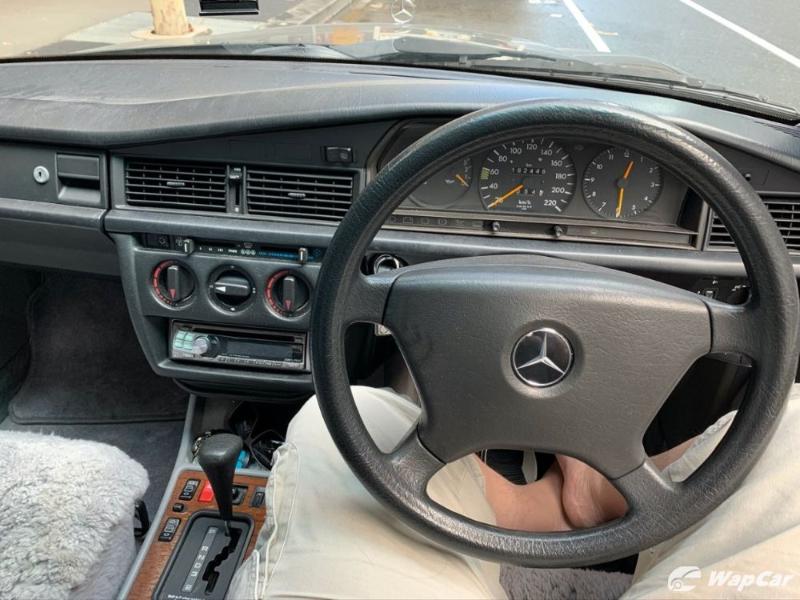
Who am I kidding – this car was the original baby Benz. I really shouldn’t be complaining about it though – it’s so easy to squeeze it into a tight parking bay on city streets and can seat 3 adults (including driver) in decent comfort. The front passenger seat is actually very roomy, and I didn’t have to slide the seat backwards to accommodate for my size. However, the same cannot be said for the driver’s seat – the driver’s cockpit is quite cramped and as a result, I have to slide the driver’s seat further back in order to fit my knees under the dashboard, even though I’m not very tall (just 181cm). As a result, the rear seat behind the driver’s position is unusable except for children. On the other hand, even with the front passenger seat left in a position suitable for my size, the passenger-side rear seat has a usable amount of legroom and is quite roomy for anyone under 170cm.
Con #3 – No catalytic converter
This was also another annoyance to me – due to Australia not having any noteworthy environmental regulations (even to this day), the car did not come with a catalytic converter. The smell of exhaust fumes is very strong when the engine is idling in a confined space (e.g. an underground parking lot).
Final thoughts
Would I have bought another version of the W201 if it was available? Actually…yes. I would have bought a 2.6 inline-6 version if I could find one in equally good condition, but unfortunately, I couldn’t. In fact, out of all W201s I searched (regardless of engine size), this particular 180E was the only one that was in good shape. The 2.6 inline-6 version would have been perfect though, with a silky smooth engine with a good amount of power lower down the rev range.
Do I regret my purchase? Definitely not – it’s a solid performer and does the job of getting from A to B smoothly and in a sublime manner. Sure, it’s underpowered but I didn’t buy this car for Ulu Yam-Gohtong runs (or touge runs on the Black Spur in the mountains east of Melbourne). It’s also a lot more fun to drive a slow car fast than a fast car slow, and this 180E really fit that bill. I get a lot more pleasure driving it than I do from my GLC43 – big surprise.
I also know that I can treat this car much more roughly compared to my GLC or E, and it’ll still be as indestructible as ever. If there was one thing Mercedes did right, it was maintaining build quality despite marketing the car at people with smaller pockets. In my other modern Mercedeses, I have to be wary of scratching the leather everywhere in the car, be it the dashboard, centre console wrap (yes, even that’s wrapped in leather), door handles, etc. No such problems in the W201 – I could use a penknife and slash at the dashboard trim or centre console, but would only end up breaking off the knife blade instead.
Unfortunately, Mercedes-Benz doesn’t build cars like they used to, so this car will be one that I will be keeping in my collection. Once I have the time, I will be restoring this car to its former glory and even then, it’s not a big project because this car was in very good shape to begin with. All it needs is just a new grille and a new paint job, sourcing an original Becker head unit that came with the car, fixing the original telescoping antenna (the existing head unit currently runs off a small, discreet antenna mounted on the windscreen, which was originally used to power a police radio due to the previous owner’s occupation in the emergency services) and that’s it. The rear seats were pretty much never used, and the front seats were never sat on directly – they were always covered with a fluffy, furry seat cover. Overall, I’m very happy with my purchase (especially considering that it costs much less than the computer I’m typing this review on).










